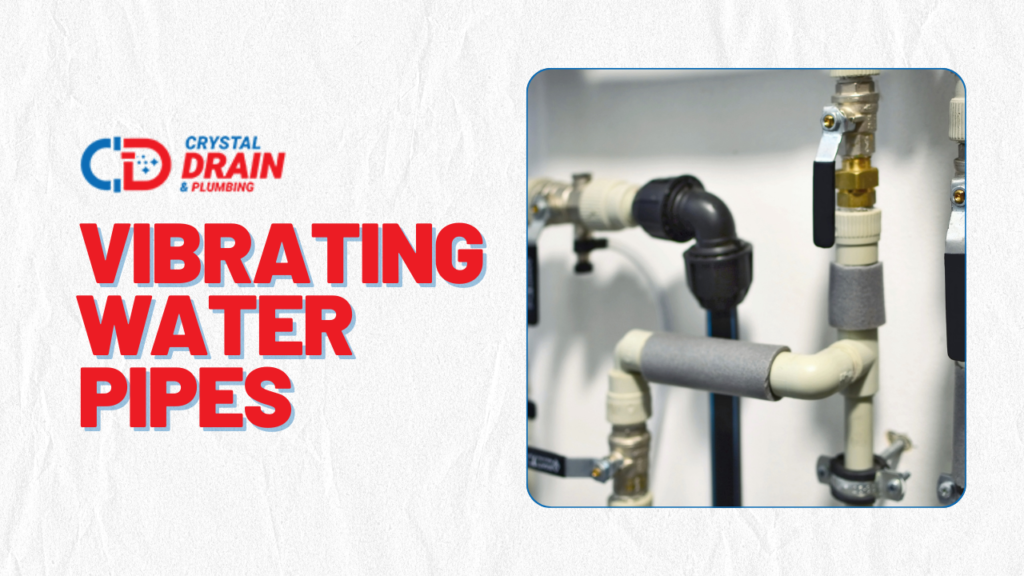- Last updated: January 15, 2025
Vibrating Water Pipes

Experiencing vibrating water pipes in your home can be both annoying and indicative of potential plumbing issues that require immediate attention. Understanding the common causes and how to address them can help prevent more serious problems down the line. Here’s a comprehensive guide to help you tackle vibrating water pipes effectively.
Key Takeaways
- Common Causes: Vibrations in water pipes can be caused by loose pipes, high water pressure, water hammer, trapped air, and temperature changes.
- Simple Fixes: Many issues can be resolved by securing pipes, adjusting water pressure, or installing water hammer arrestors.
- Professional Help: Complex problems should be handled by professionals to ensure proper resolution and avoid further damage.
- Prevention: Regular maintenance, proper installation, and routine checks can help prevent pipe vibrations and related issues.
Common Causes of Vibrating Water Pipes and Solutions
Loose Pipes
Pipes that are not securely fastened can rattle and vibrate. Check accessible pipes in areas like basements or utility rooms and secure them using pipe clips or braces. This simple fix often resolves the vibration without needing professional intervention.
High Water Pressure
Excessively high water pressure is a frequent cause of noisy, vibrating pipes. High pressure can also lead to long-term damage. Installing a pressure-reducing valve can help maintain safe water pressure levels and reduce vibrations.
Water Hammer
Water hammer occurs when there is a sudden cessation of water flow, causing shock waves through the pipes. Installing water hammer arrestors can absorb these shock waves and prevent pipe vibrations. For more complex setups, consulting a professional is advisable.
Air in Pipes
Trapped air can create loud gurgling or vibrating noises. Purging the air from your plumbing system involves turning off the water supply, draining the pipes, and systematically reopening faucets to release trapped air.
Loose Supports
Inadequate support can cause pipes to move and vibrate. Adding extra clamps or support brackets can stabilize your plumbing and reduce vibrations.
Temperature Changes
Pipes can expand and contract due to temperature fluctuations, especially in homes with PVC piping. Adjusting your hot water heater settings may help mitigate this issue and reduce vibrations.

Preventive Measures
Regular Inspections
Schedule regular inspections to ensure your plumbing system is in good condition. Early detection of issues like loose pipes or high pressure can save you from costly repairs.
Upgrade Outdated Plumbing
Old or outdated plumbing systems are more prone to issues like vibrations. Upgrading to modern materials and fittings can help reduce noise and improve efficiency.
Install Pressure Regulators
Installing pressure regulators can help maintain a balanced water pressure throughout your home, preventing issues related to high pressure.
Preventive Measures
Regular Inspections
Schedule regular inspections to ensure your plumbing system is in good condition. Early detection of issues like loose pipes or high pressure can save you from costly repairs.
Upgrade Outdated Plumbing
Old or outdated plumbing systems are more prone to issues like vibrations. Upgrading to modern materials and fittings can help reduce noise and improve efficiency.
Install Pressure Regulators
Installing pressure regulators can help maintain a balanced water pressure throughout your home, preventing issues related to high pressure.
Additional Causes and Considerations
Pipe Material
Certain materials like metal pipes can be more prone to noise and vibrations than plastic ones. If vibrations persist, consider consulting a plumber about the possibility of replacing sections of piping.
Water Flow Changes
Changes in water flow, such as those caused by new appliances or renovations, can lead to vibrations. Ensuring that any new installations are compatible with your existing plumbing can prevent these issues.
Foundation Shifts
In some cases, shifts in your home’s foundation can cause pipes to vibrate or move. If you notice other signs of foundation issues, such as cracks in walls or uneven floors, consult a structural engineer.

When to Call a Professional
FAQs
Vibrating water pipes can result from loose pipes, high water pressure, water hammer, trapped air, or temperature changes causing expansion and contraction.
Yes, high water pressure can cause noisy pipes and lead to long-term damage. A pressure-reducing valve can help manage water pressure and reduce vibrations.
Water hammer is caused by sudden water flow cessation, creating shock waves that cause pipe vibrations. Installing water hammer arrestors can prevent this issue.
A rattling noise when water flows can indicate loose pipes. Secure visible pipes with clips or brackets to prevent movement.
Simple fixes like securing loose pipes can be DIY projects. For issues like water pressure adjustments or installing arrestors, professional assistance is recommended.
